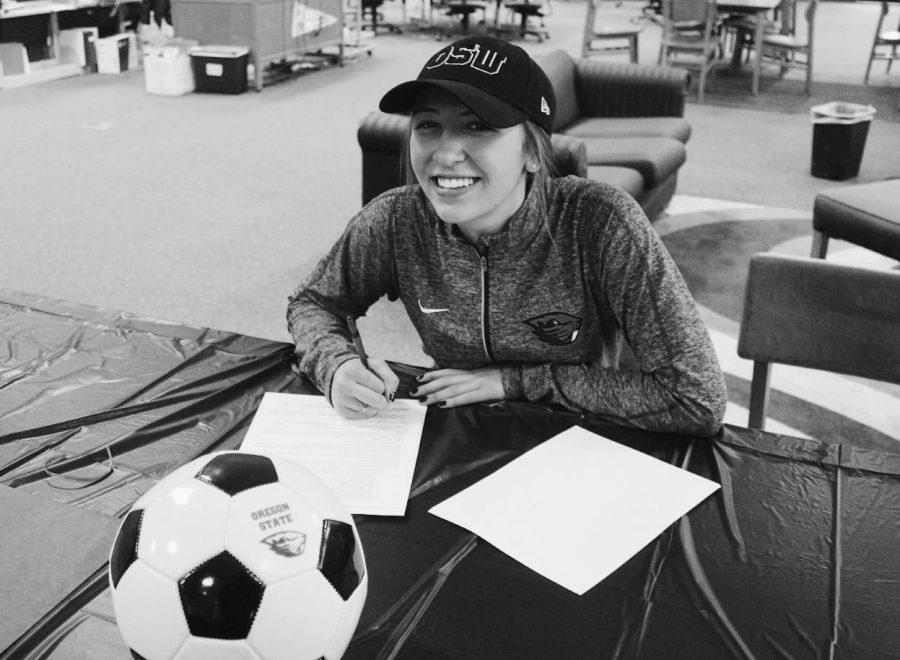Krening: Coming to terms with an end
May 28, 2020
Right now, I’m alone in Corvallis, spending my last few weeks as an OSU student secluded to the confines of my 600-square-foot apartment.
It’s been an interesting—and oftentimes depressing—few weeks, as I’m sure it has been for nearly everyone whose life has been reshaped by the pandemic in some way. I spend my days reading, listening to music, going on long walks, trying not to think about the future, sitting in on Zoom calls.
On a recent call, I was asked what my last moment of “normalcy” was prior to COVID-19, and I could think of a few: the last time I ate at a restaurant (breakfast at Wise Cracks with my teammates to say goodbye to one of our seniors who had to abruptly leave the U.S. and fly home to Spain before the country completely shut down); the last time I sat in JavaStop at the Memorial Union, or went grocery shopping without a mask; or, when I was in the OSU athletic training room in Gill Coliseum, chatting with the staff and watching the announcement that the NCAA basketball tournament had been canceled, shortly before hearing in our locker room that spring sports had been indefinitely postponed.
COVID-19 prompted a sudden end to sports: one that, for many—particularly student-athletes themselves—must have come as a shock, a sudden realization that they’re unable to play the sport they love. Senior seasons were cut short, athletic careers abruptly concluded.
Yet, my end to sports occurred years ago, in 2016, even though I’ve spent the course of my undergraduate career as a member of the OSU Women’s Soccer team. During my time at OSU, I’ve been unable to play, unable to run, plagued by a nagging knee injury that ultimately resulted in five separate surgeries over the span of four years.
The initial injury—a torn ACL, torn lateral meniscus, sprained MCL and sprained PCL—occurred in a summer league game a month before I was due to report on campus prior to my freshman year. I was devastated when it happened, particularly at the prospect of being out for 12 months after working so hard to get to where I was. I didn’t realize it’d be the last time I’d ever see the field.
It took me years to come to terms with the fact that I could no longer play—that a key part of my life, an aspect of my identity I had always been recognized for, would cease to exist. I spent my freshman and sophomore years holding out hope that I would play again, despite countless hours of rehab and treatment and several surgeries that led to little or no progress.
It wasn’t until last summer when I traveled to see an orthopedic surgeon in Minnesota that I discovered I had a root tear of my lateral meniscus—a tear that had gone previously unnoticed in my other surgeries and had, in fact, been there since my initial injury in 2016. Surgery number five in the Twin Cities included a repair to connect my lateral meniscus back to my tibia, which meant two months of knee immobilization, non-weight bearing and crutches.
I don’t wish an injury on anyone, but I do wish everyone could experience the perspective it provides you. Competitive sports, particularly if you’ve grown up playing on club teams, is an experience many take for granted: you sometimes feel like your sport is a chore, like the fitness tests and early mornings are a drag. You don’t think about the inevitable end of your athletic career when constantly immersed in your sport.
But an injury, especially a long-term one, like an ACL or Achilles tear, is a wake-up call: a realization that playing, along with day-to-day activities—walking to class, going up stairs, standing for prolonged periods of time—is an incredible privilege. It’s something you don’t often appreciate enough until you realize you can’t do it anymore.
I walk a few miles a day now, taking in the details of Corvallis in a way I haven’t been able to before. I recently started a running progression for the first time in two years. I’m grateful for how well my knee is holding up, for finally feeling the sense of physical ability and strength I’ve longed for since 2016.
I often think about the past four years, and about my unique—and not always enjoyable—experience as a member of the soccer team and an injured student-athlete in OSU athletics. It’s difficult to avoid wondering what my life would be like if I had been able to play, and if I would be a different person than I am now. But I am ultimately grateful for the different trajectories my life has taken at OSU, even if they were often unpleasant. I’ve come to realize I wouldn’t be who I am today without my injury, and without my abrupt end to soccer.
I feel for the seniors who couldn’t finish their last season—I truly do. It’s not easy coming to terms with the conclusion of your athletic career when it’s sudden and unexpected. But to those who can play, those who are healthy and young and still have eligibility as a student-athlete at OSU: make the most of your time in your sport, whatever sports look like in the coming years.
We’ll return to some sense of normalcy eventually. And when the time comes, and you can finally take the field or court and compete again, be thankful for the moments you have, for the opportunity and privilege to play, because you never know when it could come to an end.










































































































